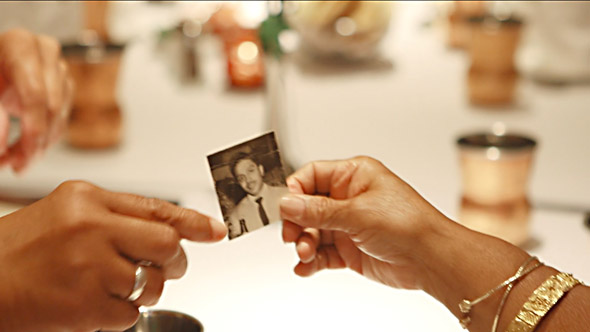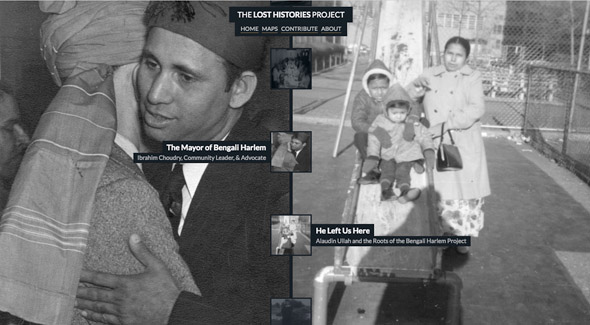Vivek Bald awarded the 2017 Levitan Prize in the Humanities and a Whiting Public Engagement Fellowship

"Over the last 15 years, Muslim and South Asian Americans have been told that they are outsiders and newcomers to the United States...One of the central goals of the Bengali Harlem project from the beginning — and this has become more important over time — is to demonstrate the longstanding presence of Muslims in the U.S."
— Vivek Bald, Associate Professor of Comparative Media Studies
Associate Professor Vivek Bald of Comparative Media Studies/Writing has been awarded the 2017 James A. (1945) and Ruth Levitan Prize in the Humanities, a $30,000 research grant that will support his work on a film and an interactive website documenting South Asian Muslims who immigrated to the United States during the 1890s-1940s, a period in which Asians were excluded from the country by law.
Bald has also been named a Whiting Public Engagement Fellow, for work on the same project. The Whiting fellowship supports humanities scholars who embrace public engagement as part of their vocation. Each Fellow receives a semester of leave to pursue a public-facing work, as well as a $10,000 stipend toward project costs.
The film and website project will expand on Bald's book, Bengali Harlem and the Lost Histories of South Asian America (Harvard University Press, 2013), which tells the story of Bengali Muslim peddlers and ship workers who entered the United States during the Asian Exclusion Era and married into local African-American and Puerto Rican communities.
"I'm so grateful," said Bald, who was officially notified of his award by Melissa Nobles, the Kenan Sahin Dean of MIT’s School of Humanities, Arts, and Social Sciences. "This project — which spans my book and the documentary and the website — has received such significant encouragement and support from colleagues and from the Dean's Office."
Nobles said her office received many excellent proposals for this year's Levitan Prize, which supports innovative and creative scholarship in the humanities. "A committee of senior faculty judged Vivek's proposal the most outstanding," she said. "His subject is turning out to be extremely topical, so I look forward to seeing the completed documentary."

Image courtesy of Vivek Bald
"At the height of the Asian Exclusion era, when the United States shut its doors on these South Asian migrants escaping British colonial rule, it was African-American and Puerto Rican families and neighborhoods that provided migrants with the possibility of building lives here."
— Vivek Bald, Associate Professor of Comparative Media Studies
Indeed, recent U.S. efforts to curtail immigration from Muslim-majority nations underscore the relevance of examining this period of history, Bald said.
"Over the past 15 years, Muslim and South Asian Americans have been told that they are outsiders and newcomers who are so alien that they pose a threat to the United States' national identity and culture. These ideas of essential difference and existential threat are at the ideological core of the violence against Muslims and South Asians," he said. "One of the central goals of the Bengali Harlem project from the beginning — and this has become more important over time — is to demonstrate, in the face of these ideas, the more than century-long presence of South Asian Muslims in the United States."
Bald's project focuses on a period during which Asian laborers were legally barred from the United States, beginning with the Chinese Exclusion Act of 1882 and continuing with the more expansive Asiatic Barred Zone Act of 1917 and in most respects until the Immigration Act of 1965. "In the early twentieth century, nativist politicians and labor leaders stoked a moral panic about Asian immigration," Bald said, noting that nativists used a combination of economic and racial arguments for the exclusion."Asians were represented as shifty and sinister, as conduits for disease, as un-Christian, uncivilized, and unassimilable."
Nevertheless, many South Asian Muslim men did immigrate, and in places like New York, New Orleans, and Detroit, found themselves welcomed into working-class communities of color. "At the height of the Asian Exclusion era, when the United States shut its doors on these South Asian migrants escaping British colonial rule, it was African-American and Puerto Rican families and neighborhoods that provided migrants with the possibility of building lives here," Bald said.

Image from the Lost Histories Project website, courtesy of Vivek Bald
Bald also plans to use Levitan Prize and Whiting funds to finish and launch the interactive "Lost Histories Project" website. The site will be centered on a vibrant, cross-racial, multi-faith community that once existed, and will be both for the general public and for relatives and descendants, who will be able to contribute stories, interact, and reconnect on the site.
Bald said he plans to use the Levitan Prize and Whiting funds to finish shooting the documentary film "In Search of Bengali Harlem." The film follows Bald's collaborator, Alaudin Ullah, a playwright and the Harlem-raised son of one undocumented Bengali migrant, as he tries to learn more about his father’s past. "As he connects with other descendants of Bengali ship workers and their African-American and Puerto Rican wives, the film reveals the vibrant cross-racial, multi-faith community that once existed in the shadows of racial segregation and anti-Asian immigration laws," Bald said.
Bald also plans to use the new funding to finish and launch the interactive "Lost Histories Project" website. The site will be centered on this mixed community and meant both for the general public and for relatives and descendants, who will be able to contribute stories, interact, and reconnect on the site. Whereas the book and film of necessity have defined narratives, Bald noted, the website will accommodate a multiplicity of voices, so that even contradictory accounts can be heard.
The site will enable community members to tag photos with text or audio recordings, for example, to identify people pictured or share memories about places. "The images that will be part of this site will not be an end point — evidence that something happened — but beginning points for further storytelling," Bald said.
Established through a gift from the late James A. Levitan, a 1945 MIT graduate in chemistry who was also a member of the MIT Corporation, the Levitan Prize was first awarded in 1990.
Suggested Links
Whiting Foundation Public Engagement Fellows
Comparative Media Studies/Writing
Archive Story: The hidden history of Bengali Harlem
New book details the overlooked waves of South Asian immigrants to the United States.
Story prepared by MIT SHASS Communications
Editorial team: Kathryn O'Neill and Emily Hiestand
Photo of Vivek Bald by Jon Sachs, MIT SHASS Communications